国际商务谈判(英文)教案讲义 chapter 1 International Business Negotiation
国际商务谈判教学Chapter 1

In fact conflict can be productive.The objective is to learn how to manage it so that the destructive elements are controlled while the productive aspects are enjoyed.
Conflict
---the levels
Conflict exists everywhere. One way to classify conflict is by level, and four levels of conflict are commonly identified. (Roy J. Lewicki et al, 1985. Negotiation. p17-18. McGraw Hill)
6) Successful negotiation involves the management of intangibles(无形) as well as the resolving of tangibles(有形).
Correct understanding of negotiation(3 issues)
Chapter One:
The General Overview of
International Business Negotiation
•I: Terminology of Negotiation •II: Understanding the Framework of IBN •III: Psychology in negotiation •IV: Case study: (Items & necessity)
国际商务谈判Chapter1InternationalBusinessNegotiation.ppt
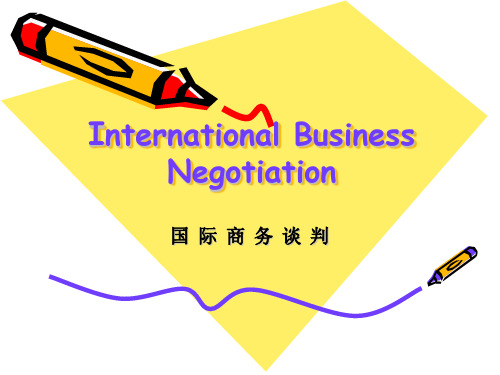
国际商务谈判
Chapter 1 Fundamentals of International Business Negotiating
第一章 国际商务谈判概述
• 1.1 Concepts and principles of negotiation
• As the stakes in some of these negotiations are not so high, people need not have to get preplans for the process and the outcome. There are other cases like international business negotiations in which the stakes are too high to be ignored, people have to be more cautious.
Characteristics of business negotiation
• Some of the characteristics of business negotiation include:
• ① Negotiation is at the heart of every transaction and, for the most part, it comes down to the interaction between two sides with a common goal (profits) but divergent methods.
• In negotiations, both parties should know: • a. why they negotiate • b. who they negotiate with • c. what they negotiate about • d. where they negotiate • e. when they negotiate • f. how they negotiate
商务英语国际商务谈判教案
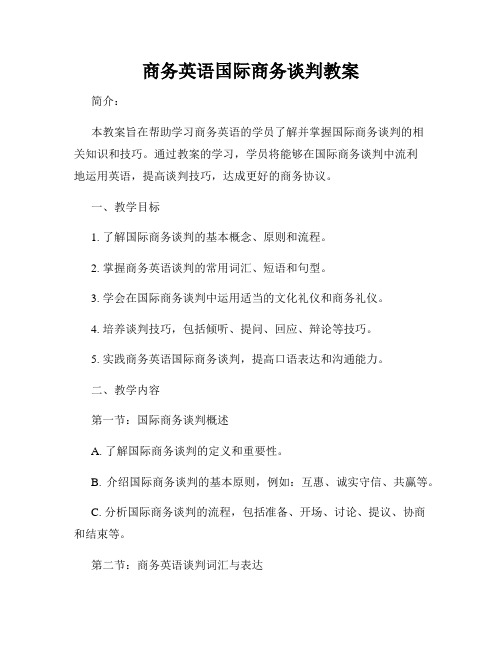
商务英语国际商务谈判教案简介:本教案旨在帮助学习商务英语的学员了解并掌握国际商务谈判的相关知识和技巧。
通过教案的学习,学员将能够在国际商务谈判中流利地运用英语,提高谈判技巧,达成更好的商务协议。
一、教学目标1. 了解国际商务谈判的基本概念、原则和流程。
2. 掌握商务英语谈判的常用词汇、短语和句型。
3. 学会在国际商务谈判中运用适当的文化礼仪和商务礼仪。
4. 培养谈判技巧,包括倾听、提问、回应、辩论等技巧。
5. 实践商务英语国际商务谈判,提高口语表达和沟通能力。
二、教学内容第一节:国际商务谈判概述A. 了解国际商务谈判的定义和重要性。
B. 介绍国际商务谈判的基本原则,例如:互惠、诚实守信、共赢等。
C. 分析国际商务谈判的流程,包括准备、开场、讨论、提议、协商和结束等。
第二节:商务英语谈判词汇与表达A. 学习常用的商务英语谈判词汇和短语,例如:offer, counteroffer, negotiation, compromise, agreement等。
B. 掌握商务英语谈判句型,例如:I propose...; We suggest...; Our position is...等。
C. 练习商务英语谈判对话,模拟真实的商务谈判场景。
第三节:文化礼仪和商务礼仪A. 了解不同国家和地区的文化差异对商务谈判的影响。
B. 学习在国际商务谈判中适应文化差异的礼仪和注意事项。
C. 分析跨文化沟通的误解和解决方法,培养跨文化谈判的敏感性和灵活性。
第四节:谈判技巧与策略A. 掌握谈判中的基本技巧,例如:倾听、提问、回应、辩论等。
B. 学习谈判策略和战术,例如:时间压力、信息收集、权力平衡等。
C. 分析谈判中的利益分析和权力分析,了解各方的需求和立场。
第五节:实践与案例分析A. 进行商务英语国际商务谈判的实践演练,学员分组进行角色扮演。
B. 分析实际商务谈判案例,并讨论谈判结果和相关的经验教训。
三、教学方法1. 配合教材讲解,介绍相关理论知识和实际案例。
商务谈判(双语)chapter1
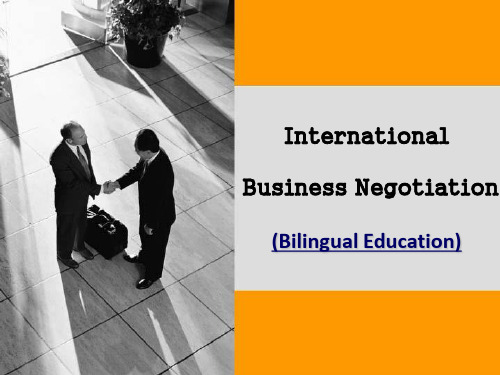
In negotiation people should know the following:5W1H :
1、掌握商务谈判概念 、 2、理解并掌握谈判的原则 、 3、理解谈判的特点,并掌握国际商务谈 、理解谈判的特点, 判的特点 4、初步了解国际商务谈判的主要内容 、
请阅读教材1.1 请阅读教材 Introduction,然后 , 回答下列问题: 回答下列问题:
1、Do you have any experience of negotiating 、
with anyone? 2、Please share your experience with us. 、
1.2 Concepts &Characteristics of &Characteristics Business Negotiation Q1、 What is negotiation? 、 Q2、Why do people negotiate? 、 ? Q3、What are Characteristics of 、 Business Negotiation ?
homework(10%) Attendance record & homework(10%) Notes (10&) Final exam (80%)
Liulinglinglll@ 13407316200
chapter one Introduction and Overview of
作业: 作业:
查阅2005年11月 查阅2005年11月8日,中美 2005 签署的《 签署的《关于纺织品和服装 贸易的谅解备忘录》相关资 贸易的谅解备忘录》 回答: 料,回答: 1)中美双方签署这个协议 的共同利益是什么? 的共同利益是什么? 2)谈谈应该如何理解互利 互惠的原则? 互 Correct Understanding of the Features of IBN 对国际商务谈判的特点的正确理解 1.5 The Main Content of Negotiation on International Business
国际商务谈判教程chapter 1

International Business NegotiationChapter 11.Negotiation is a conferring process to eliminate conflict, adjust relationship, satisfy each other's need and maintain each other's self-interests. A negotiation must involve two or more participants and have a clear objective. It is a conferring activity on an equal basis and a process of communicating, discussion and persuasion to teach a consensus after each side makes concession.2.Business negotiation is a process of conferring in which the participants of business activities communicate, discuss, and adjust their views, settle differences and finally reach an acceptably satisfying agreement in order to close a deal or achieve a proposed financial goal. Business negotiation covers the exchange and sale of almost everything from tangible to intangible goods. The objective of business negotiation is to gain economic of financial interests. The core of negotiation is the price with equality and mutual benefit as its principle and rigorousness and accuracy as its key.3.International business negotiation refers to the discussion process between different interest groups from different countries or regions to complete a cross-border transaction. Any negotiation of this kind will be complicated and difficult due to the differences in languages, cultures, laws and politics involved. International business negotiators must have a good command of foreign languages,accurate and exact expertise, extensive knowledge of cross-culture communication, sensitive mind to the international politics, strong character or mentality, a firm and indomitable spirit and relevant negotiation skills.4.Due to different major participants, international business negotiation maybe divided into the following types: government-to-government, government-to-enterprise, producer-to-producer, producer-to-trader, retailer-to-producer, trader-to-trader, business-to-consumer negotiation between different countries.5.As far as the subject for negotiation is concerned, international business negotiation is classified as import and export goods negotiation, international technology trade negotiation, international service negotiation and international cooperation project negotiation. As the form are concerned, international business negotiation may be one-to-one, team-to-team, and multilateral. Or international business negotiation is a horizontal or vertical one according to the extent the negotiation concerns.6.Though international business negotiation takes on various forms, they fall into one of the following three basic categories: ①host-court negotiation vs guest-court negotiation; ②oral negotiation vs written negotiation; and ③formal negotiation vs informal negotiation.7.In real practice, there can not be such a line that clearly isolates one form of negotiation from another. For instance, two sides might act as host in turn during the negotiation, or choose a neutral location; oral negotiation and written negotiations are held alternately; informal negotiation can develop directly into formal one, or two sides straightforwardly start with formal negotiation.8.Time, location, people and subject matter should be taken into consideration in choosing the approaches to negotiation. Negotiators should not be rigidly formalistic. Instead, they should remember their goal is to reach a mutually acceptable settlement.。
第一章 《国际商务谈判概要》微课双语讲稿

第一章《国际商务谈判概要》微课讲稿今天我们学习第一章:国际商务谈判概要。
通过本章学习,同学们应了解国际商务谈判的概念、特点、要素、类型和流程等知识;识别影响国际商务谈判的相关环境因素的内容;掌握相关信息的检索和分析方法。
译文:Today, we are to deal with Chapter One: Introduction to International Business Negotiation. Through the study of this chapter, we should understand the concept, characteristics, elements, types and processes of international business negotiation, and identify the contents of relevant environmental factors which affect the negotiation, and master the retrieval and analysis methods of the related information.1.国际商务谈判的定义和特点首先我们来了解国际商务谈判的定义和其特点。
国际商务谈判是指在国际语境下一系列的围绕着双方或多方共同利益或感兴趣的议题而展开的交易活动或互惠互利的商业协议活动磋商过程。
它的特点为既是经济活动,又是跨国性;应按照国际商务惯例展开(规则、程序和法律等);跨国交易具有复杂性和不稳定性等诸多因素(如跨文化因素、国际汇率因素、政治法律因素、经济环境和技术环境因素,以及各种风险因素等因素)译文:1.Definition and Characteristics of International Business NegotiationFirst of all, let's talk about the definition and characteristics of international business negotiation. International business negotiation refers to a series of trade activities or mutually beneficial business agreement negotiation processes in the international context around the issues of common interests of both parties or multiple parties. It is characterized by both economic activities and transnational nature; it should be carried out in accordance with international business practices (such as rules, procedures and laws); transnational transactions have variable factors of complexity and instability (such as cross-cultural factors, international exchange rate factors, political and legal factors, economic and technological factors, and other various potential risk factors).2.谈判要素构成根据商务谈判的特性,商务谈判由谈判的主体谈判和客体、谈判的议题、信息的准备、时间与地点四个方面构成了谈判要素。
国际商务谈判(英文)教案讲义chapter1InternationalBusinessNegotia
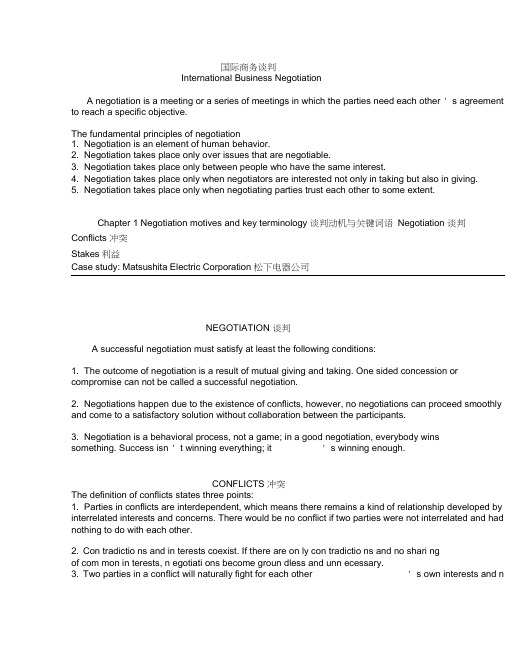
国际商务谈判International Business NegotiationA negotiation is a meeting or a series of meetings in which the parties need each other ' s agreement to reach a specific objective.The fundamental principles of negotiation1. Negotiation is an element of human behavior.2. Negotiation takes place only over issues that are negotiable.3. Negotiation takes place only between people who have the same interest.4. Negotiation takes place only when negotiators are interested not only in taking but also in giving.5. Negotiation takes place only when negotiating parties trust each other to some extent.Chapter 1 Negotiation motives and key terminology 谈判动机与关键词语Negotiation 谈判Conflicts 冲突Stakes利益Case study: Matsushita Electric Corporation 松下电器公司NEGOTIATION 谈判A successful negotiation must satisfy at least the following conditions:1. The outcome of negotiation is a result of mutual giving and taking. One sided concession or compromise can not be called a successful negotiation.2. Negotiations happen due to the existence of conflicts, however, no negotiations can proceed smoothly and come to a satisfactory solution without collaboration between the participants.3. Negotiation is a behavioral process, not a game; in a good negotiation, everybody winssomething. Success isn ' t winning everything; it ' s winning enough.CONFLICTS 冲突The definition of conflicts states three points:1. Parties in conflicts are interdependent, which means there remains a kind of relationship developed by interrelated interests and concerns. There would be no conflict if two parties were not interrelated and had nothing to do with each other.2. Con tradictio ns and in terests coexist. If there are on ly con tradictio ns and no shari ngof com mon in terests, n egotiati ons become groun dless and unn ecessary.3. Two parties in a conflict will naturally fight for each other ' s own interests and nevery effort to gain more from the other side, as a result it will reduce gain of interestsexpected in itially.STAKES利益Stakes are the value of ben efits that may be gained or lost, and costs that may bein curred or avoided. Four points n eed to be clarified:1. Negotiation parties will either gain the interests they expect to win from then egotiati on or lose what they hope to attai n, which in dicates that the talks are pert inent to releva nt parties ' own affairs and in terests. Only whe n a party has stakes conn ected with the issues to be talked, can it become actively engaged in the negotiation.2. Free lunch is not provided at the n egotiati on table, in ano ther word, to get what is desired, both parties have to pay for the gaining at either high cost or low cost depe nding on how well n egotiators man age the situati on.3. The n egotiators will have to decide how much of stakes can be gained and whether a particular gain is the one that a party desires for. They will also have to decide how much they may gain if they choose opti on A in stead of opti on B.4. Negotiators will have to compare and bala nee the relati on betwee n the curre nt in terests and long term in terests or un derly ing desires in order to make decisi on on satisfy ing long term interests at the cost of current interests.Effective negotiati ng (VCD)成功谈判Who s who in Effective NegotiationThe compa niesLevien SA , based in Brussels, Belgium.It is an intern ati onal compa ny which manu factures specialist paints and dyes.In its head office it has a small IT function which the company has decided to outsource.Okus IT, based in Swindon, in the South of En gla nd.They specialize in managing IT projects and taking over the IT departments of theirclie nt compa ni es.The n egotiati onOkus have sent a detailed writte n proposal to Levie n.The meet ing has bee n arran ged to n egotiate the terms of any agreeme nt.In particular the following two issues are likely to be sticking points:1. StaffingLevien would like to protect the jobs of their current IT team.They want Okus to employ the four members of the team, and are under pressure from the unions to make sure outsourcing contracts like this do not lead to redundancies.Okus, on the other hand, will not want totake on Levien ' s whole team.They already have project engineers based in Swindon.2. PricingOkus have proposed two levels of IT support: Level AA fixed monthly price which will cover all support work (daily maintenance and customer support) and specified project work (hardware and software upgrades, training. Etc.) Level BA lower monthly invoice based on just support work. Any additional project work will be logged and then added to the invoice the following month.1. Preparing the groundThe peopleAndrew Carter is Export Sales Manager for Okus IT. He has made the initial contact with Levien. He has met one of the Levien team, Sean, before.Karen Black is a Project Manager at Okus IT. She has prepared the specifications for this contract. This is the first time she has been involved in negotiating an overseas outsourcing contract. She is anxious about the meeting.Francoise Quantin is the current IT Manger at Levien. She is about to be promoted to Head of Logistics. She is keen that her IT team are protected.Sean Morrissey is from Levien ' s main subsidiary in Chicago. He has been sent to the Brussels Office to develop Levien ' s procurement policy.The negotiationAs the VCD begins, Andrew and Karen have arrived at Levien 'osffices and are waiting to meet Francoise and Sean.Script 1Karen Black and Andre Carter fail to communicate before they meet the Levin team.A =Andrew K =Karen F =Fran?oise S =SeanA: You sure you don ' t want one, Karen?K: Not for me.A: Of course, I don ' t know Francoise at all, but you ___ 'wviethgSoetyou about negotiating with him in Dallas two years ago, didn ' t I?K: I ' m sure you did, An drew. Can we just focus on the final package? We mustn . ' t They' re going to __ , but we ___ .A: That' s right. Sean was Head of Procurement at TEC in Atlanta.K: What we must keep in mind is _____ if they push us on staff cuts.A: Oh, we don ' t need to worry about that, Karen. We ________ . Se^hjjulsow are you?S: Good to see you aga in, An drew. Atla nta, was n ' t it?A: Dallas, actually.S: Right, three years ago.A: Two.S: Yeah, sure. You two know each other, right?F: You must be Karen Black. I ' m Francoise Quantin. Welcome to Lebvien.K: we ve spoken on the phone, haven ' t we? This is Andrew Carter, ourA: Sorry, I thought you two already knew each other.S: Well, ____ . Can we …?F: Before we start, would you like a coffee?K: That would be ni ce.F: Milk?K: Yes, please.Script 2Kare n Black and Andre Carter are better prepared for their meeti ng with the Lev in team.A: There you go.K: tha nks.A: So, we ' ll wait fdJielm to respond to our proposal.K: Yes, we know that the staff cuts and the price are __ ut we ' d better .A: And you ' d still like me to do the presentation?K: That ' s what hesad-h un ted you for, An drew.A: And you ' ll watch for their react ions and …K: And deal with any questio ns. Yes.A: Be careful with Sea n, Karen. He drives a hard barga in.K: I ' m sure I can handle him. Wen for a long day, aren ' t we?A: Well, you did pack a toothbrush, didn ' t you?F: Sorry to have kept you waiting. You must be Karen Black. I ' m Francoise Quantin and this is Sea n Morrissey.S: Good to meet you, Karen. Fran coise, this is my old sparri ng part ner, An drew Carter.F: Nice to meet you, An drew. How was your flight?K: Excelle nt. Less tha n an hour.A: Hardly time for the breakfast ___ .F: What about a coffee the n, before we start?S: Yeah, you can ___ .F: There ' s no need to hurry. Karen.S: An drew, you ' ll have ano ther one?A: Please. Milk, three sugars.F: Sit down, please.A: Are you ___ , Sean?S: Yeah, I ' m misshiengkitds and my wife. Andre and I _ in Dallas two years ago.A: Yes, __ ---thirty-six hours, wasn ' t it?S: Andrew, if a job ' s worth_d_o_i_n_g.,F: Perhaps we had better start now.。
商务谈判教案1-2章PPT课件
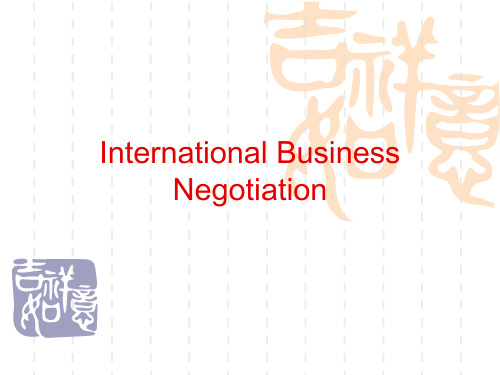
Chapter 1 Fundamentals of International Business Negotiation
▪ 1.1 Concepts and Principles of Business Negotiation
▪ 1.2 Correct Understanding of Negotiation ▪ 1.3 Stages of Negotiation ▪ 1.4 Psychology in Negotiation
▪ Element of human behavior ▪ Negotiable issues ▪ Between people with the same interests ▪ Taking but also giving ▪ Trust each other
1.1.1 Legal Definition of Negotiation
Concepts and Principles
▪ What Is Business Negotiation ▪ Characteristics of Business Negotiation ▪ The Basic Principles of Negotiation
Explanation of Definition
▪ It is a process by which the involved parties or group resolve matters of dispute by holding discussions and coming to an agreement which can be mutually agreed by them.
- 1、下载文档前请自行甄别文档内容的完整性,平台不提供额外的编辑、内容补充、找答案等附加服务。
- 2、"仅部分预览"的文档,不可在线预览部分如存在完整性等问题,可反馈申请退款(可完整预览的文档不适用该条件!)。
- 3、如文档侵犯您的权益,请联系客服反馈,我们会尽快为您处理(人工客服工作时间:9:00-18:30)。
国际商务谈判International Business NegotiationA negotiation is a meeting or a series of meetings in which the parties need each other’s agreement to reach a specific objective.The fundamental principles of negotiation1. Negotiation is an element of human behavior.2. Negotiation takes place only over issues that are negotiable.3. Negotiation takes place only between people who have the same interest.4. Negotiation takes place only when negotiators are interested not only in taking but also in giving.5. Negotiation takes place only when negotiating parties trust each other to some extent.Chapter 1 Negotiation motives and key terminology 谈判动机与关键词语Negotiation谈判Conflicts冲突Stakes利益Case study: Matsushita Electric Corporation 松下电器公司————————————————————————————————————NEGOTIATION谈判A successful negotiation must satisfy at least the following conditions:1. The outcome of negotiation is a result of mutual giving and taking. One sided concession or compromise can not be called a successful negotiation.2. Negotiations happen due to the existence of conflicts, however, no negotiations can proceed smoothly and come to a satisfactory solution without collaboration between the participants.3. Negotiation is a behavioral process, not a game; in a good negotiation, everybody wins something. Success isn’t winning everything; it’s winning enough.CONFLICTS冲突The definition of conflicts states three points:1. Parties in conflicts are interdependent, which means there remains a kind of relationship developed by interrelated interests and concerns. There would be no conflict if two parties were not interrelated and had nothing to do with each other.2. Contradictions and interests coexist. If there are only contradictions and no sharing of common interests, negotiations become groundless and unnecessary.3. Two parties in a conflict will naturally fight for each other’s own interests and make every effort to gain more from the other side, as a result it will reduce gain of interests expected initially.STAKES利益Stakes are the value of benefits that may be gained or lost, and costs that may be incurred or avoided. Four points need to be clarified:1. Negotiation parties will either gain the interests they expect to win from the negotiation or lose what they hope to attain, which indicates that the talks are pertinent to relevant parties’ own affairs and interests. Only when a party has stakes connected with the issues to be talked, can it become actively engaged in the negotiation.2. Free lunch is not provided at the negotiation table, in another word, to get what is desired, both parties have to pay for the gaining at either high cost or low cost depending on how well negotiators manage the situation.3. The negotiators will have to decide how much of stakes can be gained and whether a particular gain is the one that a party desires for. They will also have to decide how much they may gain if they choose option A instead of option B.4. Negotiators will have to compare and balance the relation between the current interests and long term interests or underlying desires in order to make decision on satisfying long term interests at the cost of current interests.Effective negotiating (VCD)成功谈判Who’s who in Effective NegotiationThe companiesLevien SA , based in Brussels, Belgium.It is an international company which manufactures specialist paints and dyes.In its head office it has a small IT function which the company has decided to outsource.Okus IT, based in Swindon, in the South of England.They specialize in managing IT projects and taking over the IT departments of their client companies.The negotiationOkus have sent a detailed written proposal to Levien.The meeting has been arranged to negotiate the terms of any agreement.In particular the following two issues are likely to be sticking points:1. StaffingLevien would like to protect the jobs of their current IT team.They want Okus to employ the four members of the team, and are under pressure from the unions to make sure outsourcing contracts like this do not lead to redundancies. Okus, on the other hand, will not want to take on Levien’s whole team.They already have project engineers based in Swindon.2. PricingOkus have proposed two levels of IT support:Level AA fixed monthly price which will cover all support work (daily maintenance and customer support) and specified project work (hardware and software upgrades, training. Etc.)Level BA lower monthly invoice based on just support work. Any additional project work will be logged and then added to the invoice the following month.1.Preparing the groundThe peopleAndrew Carter is Export Sales Manager for Okus IT. He has made the initial contact with Levien. He has met one of the Levien team, Sean, before.Karen Black is a Project Manager at Okus IT. She has prepared the specifications for this contract. This is the first time she has been involved in negotiating an overseas outsourcing contract. She is anxious about the meeting.Francoise Quantin is the current IT Manger at Levien. She is about to be promoted to Head of Logistics. She is keen that her IT team are protected.Sean Morrissey is from Levien’s main subsidiary in Chicago. He has been sent to the Brussels Off ice to develop Levien’s procurement policy.The negotiationAs the VCD begins, Andrew and Karen have arrived at Levien’s offices and are waiting to meet Francoise and Sean.Script 1Karen Black and Andre Carter fail to communicate before they meet the Levin team.A =Andrew K =Karen F =Franςoise S =SeanA: You sure you don’t want one, Karen?K: Not for me.A: Of course, I don’t know Francoise at all, but you’ve got to ____ with Sean. I toldyou about negotiating with him in Dalla s two years ago, didn’t I?K: I’m sure you did, Andrew. Can we just focus on the final package? We mustn’t ____. They’re going to ____, but we ____.A: That’s right. Sean was Head of Procurement at TEC in Atlanta.K: What we must keep in mind is ____ if they push us on staff cuts.A: Oh, we don’t need to worry about that, Karen. We’ll just ____. Sean, how are you? S: Good to see you again, Andrew. Atlanta, wasn’t it?A: Dallas, actually.S: Right, three years ago.A: Two.S: Yeah, sure. You two know each other, right?F: You must be Karen Black. I’m Francoise Quantin. Welcome to Lebvien.K: We’ve spoken on the phone, haven’t we? This is Andrew Carter, our ____.A: Sorry, I thought you two already knew each other.S: Well, ____. Can we…?F: Before we start, would you like a coffee?K: That would be nice.F: Milk?K: Yes, please.Script 2Karen Black and Andre Carter are better prepared for their meeting with the Levin team.A: There you go.K: thanks.A: So, we’ll wait for t hem to respond to our proposal.K: Yes, we know that the staff cuts and the price are ____, but we’d better ____.A: And you’d still like me to do the presentation?K: That’s what we head-hunted you for, Andrew.A: And you’ll watch for their reactions and …K: And deal with any questions. Yes.A: Be careful with Sean, Karen. He drives a hard bargain.K: I’m sure I can handle him. We’re in for a long day, aren’t we?A: Well, you did pack a toothbrush, didn’t you?F: Sorry to have kept you waiting. You must b e Karen Black. I’m Francoise Quantin and this is Sean Morrissey.S: Good to meet you, Karen. Francoise, this is my old sparring partner, Andrew Carter. F: Nice to meet you, Andrew. How was your flight?K: Excellent. Less than an hour.A: Hardly time for the breakfast____.F: What about a coffee then, before we start?S: Yeah, you can ____.F: There’s no need to hurry. Karen.S: Andrew, you’ll have another one?A: Please. Milk, three sugars.F: Sit down, please.A: Are you ____, Sean?S: Yeah, I’m missing t he kids and my wife. Andre and I ____in Dallas two years ago. A: Yes, ____---thirty-six hours, wasn’t it?S: Andrew, if a job’s worth doing, _____.F: Perhaps we had better start now.。
